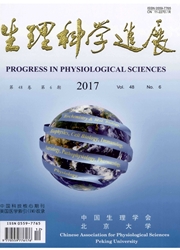

 中文摘要:
中文摘要:
高血压可引发多种心脑血管并发症,严重威胁人类健康。目前研究发现,高血压患者免疫调节功能异常,可导致持续性的炎症。而炎症可损伤血管内皮功能,激活肾素-血管紧张素系统,引起血管重构、血管硬化、血管舒缩功能异常等,加重高血压的发展。高血压患者免疫调节功能异常主要涉及非特异性免疫中的吞噬细胞对组织的浸润、树突细胞的抗原递呈、自然杀伤细胞的活化以及特异性免疫中T细胞的活化等。Toll样受体识别抗原启动免疫系统,从而引发炎症是高血压免疫机制的关键。自主神经系统也与高血压发生发展密切相关,自主神经对免疫具有调节作用,高血压患者自主神经失衡,导致免疫调节异常,引发心血管损伤,造成血管舒缩功能异常,从而加剧高血压的发展。因此,对神经免疫调节的研究有望为高血压的治疗提供新的策略。本文就高血压中免疫机制以及自主神经系统对免疫系统调节作用的研究进展作一综述。
 英文摘要:
英文摘要:
Hypertension, which can cause a variety of cardiovascular and cerebrovascular complications, is a serious threat to human health. Currently, it is found that hypertension is related to immunoregulatory abnormality, which could lead to chronic inflammation. Then the chronic inflammation may impair vascu- lar endothelial function and activate renin-angiotensin system, which cause vascular remodeling, angio- sclerosis, dysfunctional vasoconstriction and vasodilatation, and exacerbate hypertension. The immuno- regulatory abnormality of hypertension involves macrophage infiltration of the organization, the dendritic cells of antigen presentation and natural killer cells of activation in nonspecific immunity and activation of T cells in specific immune. The key of immunity mechanism of hypertension is the Toll like receptor to activate immune system and lead to inflammation. Autonomic nervous system is also closely related to the development and progression of hypertension. Autonomic imbalance in hypertension leads to immunoregu- latory abnormality, cardiovascular injury, and dysfunctional vasoconstriction and vasodilatation, which ultimately results in exacerbation of hypertension. Therefore, research on neuro-immune regulation will help to provide novel strategies for therapy of hypertension. In this review, we will provide an overview of the research progress of the immunity mechanism of hypertension and the regulation of immune system by the autonomic nervous system.
 同期刊论文项目
同期刊论文项目
 同项目期刊论文
同项目期刊论文
 期刊信息
期刊信息
